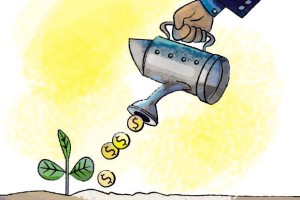December 13, 2016
 CIBIL Score is a crucial aspect in determining your home loan eligibility. Every time you apply for home loan, your lender checks this score for approving/disapproving your application. It is a summary of your credit history as per your credit behaviour. It depends on the following factors:
CIBIL Score is a crucial aspect in determining your home loan eligibility. Every time you apply for home loan, your lender checks this score for approving/disapproving your application. It is a summary of your credit history as per your credit behaviour. It depends on the following factors:
Past payments: All your previous payments, whether on time or delayed, are recorded with CIBIL. Consistency in making payments is considered good whereas more recent delays are seen negatively.
Settlements, defaults and write-offs: Multiple write-offs, defaults on previous loans and more recent write-offs (as opposed to older ones) have negative effects on your credit score. Defaults and delays on secured loans are worse than on unsecured loans.
Credit as proportion of income: The higher the loan balance you have, the lower your credit score will be. Less loan balance shows smart credit utilization on your part.
Credit cards: If you have high credit card balances, your credit score will be low. Consistency in repaying credit card debts improves the score. Credit cards (unsecured loans) are viewed negatively by lenders as compared to secured loans.
Different ranges of CIBIL Score
Every person with a financial history has a CIBIL score and it can range anywhere between 300 and 900, with 900 being the highest. A person can also have a score of 0 or -1, which means that they have no credit history in terms of loans and credit cards. So to get the credit history started, you must have at least one credit card or applied for a loan. Here is a breakup of CIBIL scores and what it means:
- 550 – 650: It is a fair score and accepted by many lenders. This score shows that you have been quite regular with your repayments, other than a few exceptions. Most lenders trust borrowers with this score and approve their home loans but usually with a higher interest rates.
- 300 – 550: This is the worst score anybody can have and it means that you have been defaulting on your payments. With such a score, getting credit is extremely difficult.
- 650 – 750: For home loan eligibility, this score is very promising. And if you have this credit score, you will not face any issue regarding approval of application.
- 750 – 900: It is the best possible score anybody can have and it indicates your expertise at managing your finances. Lenders will approve even a larger loan amount to you at great rates when you apply for home loan.
Tags:
Debts,
economy,
Home Loan,
Interest Rates,
investments,
loans,
money,
Mortgages
October 5, 2016
 It is one of those timeless conundrums which has tested the thinking of man for centuries. If you had to, would you do something you know was very dangerous.
It is one of those timeless conundrums which has tested the thinking of man for centuries. If you had to, would you do something you know was very dangerous.
If you saw a child about to be run over, would you step in front of a car to save them? If you are dying of thirst, would you drink filthy water to survive? If you house is on fire, would you jump out of the window to escape.
We have all pondered these kinds of questions at some point, but fortunately most of us never have to contemplate the dilemma in reality.
But there are other everyday dilemmas that we do have to confront which, whilst perhaps not involving the same danger, can still expose us to significant risk.
One such example of this is when we use online banking. We know online banking is insecure. It doesn’t matter which bank you use, and how many trendy keypads and other gadgets they give you, we all know there is still a risk when we log into our online account which isn’t there if we want into a branch.
The popularity of online banking suggests two things about this. Either we don’t fully understand the extent of the risk, or we have decided it is a risk we are willing to take. For most of us, it is a combination of both.
But make no mistake, online banking does pose a significant risk. The level of security used by all banks is extremely weak and the techniques of online hackers gets ever more sophisticated. And often we don’t help ourselves, making basic errors like using easy-to-break passwords or logging on while connected to public Wi-Fi networks.
The ramifications if you are hacked can be significant too. Of course, you can lose a lot of money. However, as most banks will compensate you in those circumstances that is sometimes not a big worry. But going into overdraft or losing a sizable amount of money can affect things like your credit cards, and premium accounts you may hold, and of course run up charges with your bank that can take months to sort out.
Then there is your credit score. If you are hacked and miss payments as a result, it can affect your credit score which might cause you to be unable to get credit and secure mortgages and other financial services.
So, the question I am often asked is whether there is a way to protect ourselves when using Online Banking. Is it possible to make the process more secure?
Encouragingly, the answer is yes. And in this article I will give you my tips as to the top 3 ways to keep your online banking secure in 2016:
1. Use an ‘Anti-Spy Privacy Screen:
For all the high-tech ways that people get hacked these days, there are still a significant number of incidents where data is stolen simply by watching over people’s shoulder as they use their online banking account in public.
It might seem silly, but it happens a lot and it is unnecessary because there is a cheap and simple bit of kit which can prevent it: an Anti-Spy Privacy Screen.
There are available for all devices these days and work in the same way as a regular screen protector. However, they are a little thicker and a little darker, and this means that when you look at the screen of a device from an angle, you can see nothing.
Only the person directly facing the screen can make out what is there, so when you log onto your online banking on the go, you can be sure that the only person looking, is you.
2. Change your Password Regularly:
Passwords are another big vulnerability of online banking. Often they are easy to guess, simple to crack, and offer little or no real protection.
One way around this is to use a Password Manager such as Last Pass which can make it easy for you to use complicated passwords without having to remember them all.
But another relatively effective approach is just to change your password on a regular basis. If you are an occasional user, making a password change every few months is a sensible precaution, but if you are logging into your account regularly and from different locations, every few weeks would be more sensible.
3. Use a VPN:
Perhaps the most important tip on this list is to use a VPN. A VPN can help ensure your online banking is secure in a variety of different ways.
Encryption is vital to keep your data secure online and whilst all banks will encrypt their online banking data, some are more secure than others. A good VPN will ensure all of your online activity, including online banking is encrypted securely.
They also protect you when you are using public Wi-Fi. Again the encryption they offer means even the weakest of Wi-Fi connections becomes secure.
Indeed, VPNs are so good at encrypting your online activity that you can even access otherwise inaccessible online services, like being able to log onto Gmail while in China, where it is usually blocked.
With a VPN in place, and using these other precautions as well, you can be pretty confident that your online banking will be secure, no matter who you bank with.
Tags:
economy,
Financial Securities,
investments,
money,
Online Banking,
savings
August 27, 2016
 Graduating from a prestigious educational institution with specialized certification in accountancy? You are all set to bag your first job in your field of interest—accounting.
Graduating from a prestigious educational institution with specialized certification in accountancy? You are all set to bag your first job in your field of interest—accounting.
Applying for that dream job might be a tedious process and waiting for a call back after an interview might take several months.
Here are three of the most important things you need to take care of so you can bag a job before your potential rivals.
1. Resume
The first—and sometimes only—thing that a HR manager looks at to decide if you are worth hiring is your resume and remember you have only 6 seconds to catch their attention. As a fresher with no experience, you might not have much on there. This means you need to figure out what content goes in your resume.
Choose an apt font and size that gives it a classic and clean-cut professional look. With some research, you can find good resume keywords online, including those that help catch the attention of the hiring committee. Avoid using capitalized, bold, and italicised terms in you bio, unless absolutely necessary.
Pick the perfect type of resume that allows you to highlight your skills and specializations. Chronological, functional, and combinational are three of the basic types of resumes among a list of many others.
Use catchy subtitles. Construct lines effectively. Do not write more than two lines for any description, and keep the language stylish yet simple. Watch carefully for grammatical errors.
Make sure you don’t go overboard with any of these tips. Your resume should portray effortless efficiency. Also, try to keep it within 2 pages.
2. Interview
Once your resume is selected, you’ll have to face the interview. Most people get nervous and anxious, and tend to mess up their interview despite their calibre and talent. This is mainly due to lack of preparation. Even though most interviewers expect you to be street-smart, a thorough knowledge in the field of your choice is also essential.
You are spoiled for choices when it comes to resources—be it online or offline—to help your prep for the interview. You can easily find blogs that give out frequently asked interview questions in a finance interview.
Apart from preparing for these questions and brushing up on your syllabi that was covered over the many semesters, you should also have a brief knowledge of software like ERP accounting software and business management software that are in trend, and are used by most organizations.
Knowledge about current affairs and the latest accounting standards is also an absolute necessity.
3. Confidence
To crack any interview, confidence is the most important factor. Your body language plays a significant role in cracking an interview. Even small signs of nervousness or uncertainty are caught during the interview. Stay confident right from when you send out your resume. The process might be a time-consuming one, but leads to success.
With some motivation, patience, and making smart choices while displaying your talents, landing your dream job is a piece of cake. Use these tips, and an accounting job is in the bag!
Tags:
Accounts,
Business,
Capital,
economy,
investments,
money
August 10, 2016
 Many homeowners have a considerable amount of cash tied up in the equity of their homes – that is, the value of the amount of the home they own, less any outstanding mortgage or loan.
Many homeowners have a considerable amount of cash tied up in the equity of their homes – that is, the value of the amount of the home they own, less any outstanding mortgage or loan.
Not only is it possible to release that equity – to enjoy its present cash value – but more homeowners than ever before appear to be choosing to do so. This is a conclusion drawn in a story published in the Guardian newspaper on the 25th of January 2016.
During the course of 2015, a record 22,500 equity release agreements were made, representing a return to the nation’s homeowners of a total of some £1.61 billion.
How do I know if equity release is right for me?
Probably the single most informative source is an online equity release calculator. It might be the best step to gaining some idea of what equity there may be in your home that may be released, depending on the value of the property and your age (you need to be 55 or over to qualify for any equity release scheme).
Combine an equity release calculator with a comparison website which shows the various interest rates currently offered by equity release providers and you may get a pretty clear idea of whether to take things further. There is generally no limit on the number of times you may use the same calculator.
There are any number of such online calculators and it might be difficult knowing which one to choose. Some of the things to look out for when choosing one, therefore, might include:
- how much equity you might be able to release, the interest rates governing the various schemes on offer and what the impact is likely to be upon your estate;
- whether the provider is a member of the Equity Release Council – since this guarantees a certain number of safeguards built into any agreement; and
- whether the site providing the calculator also offers a detailed guide on how equity release works and the arrangements that might be made to answer your queries and discuss your concerns directly with any provider.
Types of equity release
Using an equity release calculator is only the first step in what is invariably a complicated process, involving very serious decisions about the home in which you live, the funds it might unlock and the impact any agreement has on the estate you may pass on to your surviving dependents and relatives.
This makes it important that you seek the advice and guidance of a specialist in the provision of equity release agreements and embark on a learning curve that might lead to your understanding of the two principal vehicles for equity release:
- home reversion – this involves the sale of a proportion of your home to the equity release provider, so that you become a co-owner, but may continue to live in the dwelling until your share of the property is sold upon your death or when you move into long-term care; or
- lifetime mortgage – this is probably a more popular arrangement than home reversion and allows you to make a more reliable calculation of the costs involved. A lifetime mortgage is similar to a regular mortgage, but you make no repayments on the advance, which continues to attract interest in the normal way. The mortgage is repaid from the sale proceeds of the property when you die or move into long-term care.
The use of an equity release calculator may be enough to set you off on the road to unlocking some of the wealth tied up in your home.
Tags:
Business,
Equity,
financial planning,
investments,
money,
stock
March 28, 2016
 Picking mutual funds for investment is easier than picking the right time to invest in them. We give you five hints to help you choose.
Picking mutual funds for investment is easier than picking the right time to invest in them. We give you five hints to help you choose.
Every investor knows that in order to make money, he must put the money he currently has to good use. Simply letting the money sit in the bank or investing it in such instruments as real estate and gold do not always yield the best results. Besides, if the investor has both short term and long term goals, he may need to look at mutual fund investment.
But despite wishing to invest in mutual funds in India, many factors can hold an investor back. In terms of mutual funds, ‘how’ is often not as important as ‘when’. Consider these five pointers to help yourself decide when to invest in mutual funds:
1 When you do your research.
You must be willing to put in hours of study on both the fund you are interested in and the fund house. Choosing the best mutual funds cannot be a snap decision, and it cannot be based on the current favourite in the market. The fund you purchase must offer the potential for growth that you seek to realise your short term and long term financial goals. Apart from the fund, you must select the right fund manager as well. Conducting due diligence is the crucial first step to investing in the best mutual funds in India.
2 Study the fund manager’s record over three years.
Investors are often tempted to see short term results of the fund manager they wish to work with. However, experts will tell you that any amount of time short of three years is too less to analyse the manager’s performance. Analyse his track record over three to five years and discuss the various strategies he has adopted over the years vis-à-vis market fluctuations and asset allocation.
3 Choose a manager with the same investment style as yours.
A fund manager is not a magician who can convert your mutual fund investment into piles of money. Nor is he a mathematician who follows provable theorems with predictable outcomes. A fund manager studies the markets and interprets them every day, and bases his decisions on his understanding and skill. The gains may be slow in coming in some cases, while another of his decisions can fetch a windfall. However, his investment style must align with yours, or there may be conflict in reaching your fiscal goals.
4 Pick the fund of the best available ones.
Studying market forces every day and picking the right mutual fund is important for the proper realisation of your financial goals. Most people tend to go with the popular choice, or expect a long term fund to generate constant growth in the short term. Discussing the fund’s growth with your manager regularly, reading reports by financial companies and looking up the workings of the best mutual funds relays valuable information.
5 Be certain that it is the best way to create wealth.
Investing in mutual funds is a matter of faith and being open to a little risk. Sometimes, all calculations can go awry and mutual funds may show extremely low returns. Hence, it is important to be convinced about the decision to invest in a mutual fund. Only when the investor is certain that they will give the best returns will the investor be confident about putting in his money in them.
Tags:
banking,
budgeting,
economy,
financial planning,
investments,
money,
Mutual Funds
 CIBIL Score is a crucial aspect in determining your home loan eligibility. Every time you apply for home loan, your lender checks this score for approving/disapproving your application. It is a summary of your credit history as per your credit behaviour. It depends on the following factors:
CIBIL Score is a crucial aspect in determining your home loan eligibility. Every time you apply for home loan, your lender checks this score for approving/disapproving your application. It is a summary of your credit history as per your credit behaviour. It depends on the following factors:




Recent Comments